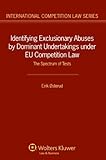Identifying exclusionary abuses by dominant undertakings under EU competition law : the spectrum of tests / Eirik Osterud.
Material type: TextLanguage: English Publication details: The Netherlands : Kluwer Law International, 2010.Description: xii, 350 pISBN:
TextLanguage: English Publication details: The Netherlands : Kluwer Law International, 2010.Description: xii, 350 pISBN: - 9789041132710
- 23 343.40721
| Item type | Home library | Collection | Shelving location | Call number | Materials specified | Status | Date due | Barcode | |
|---|---|---|---|---|---|---|---|---|---|
 Print
Print
|
OPJGU Sonepat- Campus | General Books | Main Library | 343.40721 OS-I (Browse shelf(Opens below)) | Available | 151842 |
"Under Article 102 TFEU, dominant firms are allowed to compete, but only to the extent their market behaviour does not constitute an abuse. Needless to say, the wording of the article neither explains what an abusive restriction of competition is nor how such a practice can be identified. Rather than developing a one-size-fits-all test applicable to all forms of market behaviour by dominant firms, the European Court of Justice (ECJ) and the General Court (ex; Court of First Instance) have set out a system of tests for separate categories of conduct. Drawing on the full range of the EU Courts’ relevant case law, this very useful book analyses the conditions that must be fulfilled for a broad range of business practices to be deemed abusive within the meaning of Article 102 TFEU, and also identifies the criteria that must be fulfilled for a practice to be ‘objectively justified’. The potentially abusive practices studied here (as defined in the relevant case law) include the following: predatory pricing; margin squeezing; exclusivity agreements; loyalty rebates; refusals to supply to induce exclusivity; secondary line price discrimination; vexatious litigation; acquisitions of intellectual property rights (IPRs); refusals to supply necessary inputs; provision of storage equipment on the condition of exclusive use; selective above-cost price cuts; tying; technological integration; and refusal to license IPRs. The author also contrasts the Commission’s decisional practice with the case law, assesses approaches under U.S. antitrust law to similar forms of conduct, and incorporates insights from economic theory. This study greatly enhances our understanding of the distinction between abusive conduct and lawful competition. In the course of its clarification of the EU Courts’ responses to individual forms of market behaviour, an overall approach to the identification of exclusionary abuses under Article 102 TFEU begins to come into view. Apart from the important new synthesis the work offers legal scholars, there can be little doubt this book will prove a valuable asset and even an inspiration to competition lawyers."--
There are no comments on this title.

